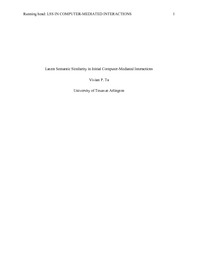
ATTENTION: The works hosted here are being migrated to a new repository that will consolidate resources, improve discoverability, and better show UTA's research impact on the global community. We will update authors as the migration progresses. Please see MavMatrix for more information.
Show simple item record
| dc.contributor.advisor | Ickes, William | |
| dc.creator | Ta, Vivian P. | |
| dc.date.accessioned | 2016-07-08T19:53:17Z | |
| dc.date.available | 2016-07-08T19:53:17Z | |
| dc.date.created | 2016-05 | |
| dc.date.issued | 2016-05-10 | |
| dc.date.submitted | May 2016 | |
| dc.identifier.uri | http://hdl.handle.net/10106/25761 | |
| dc.description.abstract | The initial interactions of same-sex strangers were investigated to examine the development of latent semantic similarity (LSS; that is, how interaction partners come to use words in the same way) in computer-mediated interactions. A previous study by Ta, Babcock, and Ickes (2016) found that verbal behaviors, rather than nonverbal behaviors, uniquely predicted the development of LSS in the initial face-to-face interactions of same-sex strangers. This suggested that LSS might develop similarly and as efficiently in conversations in which only words are exchanged (i.e., computer-mediated interactions). As such, using a sample of 120 same-sex dyads (all strangers) who interacted with each other using AOL Instant Messenger for 18 minutes, the current study hypothesized that (1) dyad-level behaviors that introduce more words into the conversation will be essential and unique predictors of dyad-level LSS; (2) higher dyad-level LSS would predict higher dyad-level perceived interaction quality; (3) higher dyad-levels of agreeableness, extraversion, and openness to experience would predict higher dyad-level LSS; (4) dyad-level LSS would mediate the relationship between dyad-level personality measures of agreeableness, extraversion, and openness to experience and dyad-level perceived interaction quality; and (5) dyad-level LSS would increase over time. The results revealed that (1) higher number of messages sent, but not the number of questions asked, significantly predicted higher LSS; (2) LSS did not significantly predict perceived interaction quality, but did predict certain factors of perceived interaction quality; (3) agreeableness, extraversion, and openness to experience did not significantly predict LSS; (4) LSS was not a significant mediator of the relationship between these 3 personality measures and perceived interaction quality; and (5) LSS decreases, rather than increases, over time, which may be attributed to a compensation effect, or to differences in dyad-level extraversion. | |
| dc.format.mimetype | application/pdf | |
| dc.language.iso | en_US | |
| dc.subject | Latent semantic similarity | |
| dc.subject | Latent semantic analysis | |
| dc.subject | Dyadic interaction | |
| dc.subject | Computer-mediated interaction | |
| dc.title | Latent Semantic Similarity in Initial Computer-Mediated Interactions | |
| dc.type | Thesis | |
| dc.degree.department | Psychology | |
| dc.degree.name | Master of Science in Psychology | |
| dc.date.updated | 2016-07-08T19:55:24Z | |
| thesis.degree.department | Psychology | |
| thesis.degree.grantor | The University of Texas at Arlington | |
| thesis.degree.level | Masters | |
| thesis.degree.name | Master of Science in Psychology | |
| dc.type.material | text | |
Files in this item
- Name:
- TA-THESIS-2016.pdf
- Size:
- 516.9Kb
- Format:
- PDF
This item appears in the following Collection(s)
Show simple item record


